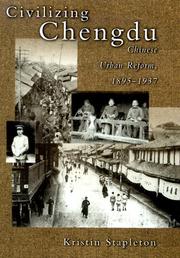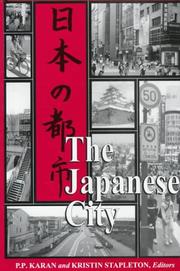| Listing 1 - 10 of 11 | << page >> |
Sort by
|
Book
ISBN: 9781503601062 9780804798693 1503601064 0804798699 9780804799737 0804799733 Year: 2016 Publisher: Stanford, California
Abstract | Keywords | Export | Availability | Bookmark
 Loading...
Loading...Choose an application
- Reference Manager
- EndNote
- RefWorks (Direct export to RefWorks)
Historical novels can be windows into other cultures and eras, but it's not always clear what's fact and what's fiction. Thousands have read Ba Jin's influential novel Family, but few realize how much he shaped his depiction of 1920s China to suit his story and his politics. In Fact in Fiction, Kristin Stapleton puts Ba Jin's bestseller into full historical context, both to illustrate how it successfully portrays human experiences during the 1920s and to reveal its historical distortions. Stapleton's attention to historical evidence and clear prose that directly addresses themes and characters from Family create a book that scholars, students, and general readers will enjoy. She focuses on Chengdu, China, Ba Jin's birthplace and the setting for Family, which was also a cultural and political center of western China. The city's richly preserved archives allow Stapleton to create an intimate portrait of a city that seemed far from the center of national politics of the day but clearly felt the forces of—and contributed to—the turbulent stream of Chinese history.
Historical fiction, Chinese --- Literature and history --- Roman historique chinois --- Littérature et histoire --- History and criticism --- History --- Histoire et critique --- Histoire --- Ba, Jin, --- Chengdu (China) --- China --- Chengdu (Chine) --- Chine --- Chinese historical fiction --- 成都 (China) --- Chengtu, China --- Tschengtu (China) --- Chʻeng-tu (China) --- Chʻeng-tu-shih (China) --- Hua-yang (China) --- Chengdu Shi (China) --- Chʻeng-tu-hsien (China) --- S16/0420 --- S16/0472 --- China: Literature and theatrical art--Modern novels: studies --- China: Literature and theatrical art--Ba Jin --- Chinese fiction --- Families in literature. --- Social change in literature. --- History and literature --- History and poetry --- Poetry and history --- Family in literature --- History and criticism. --- In literature. --- 成都市(China) --- Chʻeng-tu shih (China) --- Khreng-tuʼu (China)
Book
ISBN: 1108992943 110899492X 1108998976 Year: 2022 Publisher: Cambridge : Cambridge University Press,
Abstract | Keywords | Export | Availability | Bookmark
 Loading...
Loading...Choose an application
- Reference Manager
- EndNote
- RefWorks (Direct export to RefWorks)
Kristin Stapleton analyzes how concepts and practices associated with the 'modern city' were received, transformed, and contested in Asia over the past 150 years. In the early twentieth century, activists took advantage of the new significance of the city to pursue a wide variety of goals. Thus, the concept of the modern city played an important role in Asia, despite much critical commentary on the ideals associated with it. By the 1940s, the city yielded its political centrality to the nation. Still, modern cities remained an important marker of national achievement during the Cold War. In recent decades, cities have continued to play a central role in economic and cultural affairs in Asia, but the concept of the modern city has evolved. Asian ideas about urban governance and visions of future cities are significantly shaping that evolution.
Cities and towns --- Urban policy --- City and town life --- Economic policy --- Social policy --- Sociology, Urban --- City planning --- Urban renewal --- Cities and state --- Urban problems
Book
ISBN: 9781108992947 9781108994927 Year: 2022 Publisher: Cambridge Cambridge University Press
Abstract | Keywords | Export | Availability | Bookmark
 Loading...
Loading...Choose an application
- Reference Manager
- EndNote
- RefWorks (Direct export to RefWorks)

ISBN: 9781684173365 9780674002463 1684173361 Year: 2000 Publisher: Boston : Leiden; Boston : Harvard University Asia Center, BRILL,
Abstract | Keywords | Export | Availability | Bookmark
 Loading...
Loading...Choose an application
- Reference Manager
- EndNote
- RefWorks (Direct export to RefWorks)
This work examines the history of urban planning and administration during modern China's first age of city-centered politics, focusing on the New Policies of the late Qing and the city administration movement of the 1920s. Between 1895 and 1937, the management of cities emerged as one of the chief challenges for the Chinese state. Through a detailed case study, based on newly available archival sources, of the process of urban reform in Chengdu, a key provincial capital in the interior, Kristin Stapleton shows how urban reformers permanently changed urban administration, the urban landscape, and urban life by promoting a new type of orderly and productive community in population centers despite the many upheavals of the late Qing and Republican eras.
City planning --- Urbanization --- City planning. --- Urbanization. --- China --- History
Digital
ISBN: 9781108992947 Year: 2022 Publisher: Cambridge Cambridge University Press
Abstract | Keywords | Export | Availability | Bookmark
 Loading...
Loading...Choose an application
- Reference Manager
- EndNote
- RefWorks (Direct export to RefWorks)

ISBN: 0674002466 1684173361 Year: 2000 Publisher: Boston : Leiden; Boston : Harvard University Asia Center, BRILL,
Abstract | Keywords | Export | Availability | Bookmark
 Loading...
Loading...Choose an application
- Reference Manager
- EndNote
- RefWorks (Direct export to RefWorks)
City planning --- City planning. --- Urbanization --- Urbanization. --- China --- History
Book
ISBN: 0813159342 9780813159348 0813185327 9780813185323 Year: 2015 Publisher: Lexington The University Press of Kentucky
Abstract | Keywords | Export | Availability | Bookmark
 Loading...
Loading...Choose an application
- Reference Manager
- EndNote
- RefWorks (Direct export to RefWorks)
Japan is one of the most crowded countries on earth, with three-fourths of its population now living in cities. Tokyo is easily the most populous city on the planet. And yet, though closely packed, its citizens dwell together in relative peace. In America, inner-city violence -- often attributed in part to overcrowding -- is frequently emphasized as one of the great social problems of the day. What might we learn from Japan's situation that could be applied to our own as we approach the twenty-first century?In this collection an interdisciplinary group of international scholars seek to underst
Urban ecology (Sociology) --- City planning --- Land use, Urban --- Cities and towns
Book
ISBN: 1438466528 9781438466521 9781438466514 Year: 2017 Publisher: Albany
Abstract | Keywords | Export | Availability | Bookmark
 Loading...
Loading...Choose an application
- Reference Manager
- EndNote
- RefWorks (Direct export to RefWorks)
Discusses contemporary Confucianism's relevance and its capacity to address pressing social and political issues of twenty-first-century life.
Philosophy, Confucian --- Confucianism --- S06/0223 --- S06/0255 --- S11/0497 --- S12/0400 --- China: Politics and government--People's Republic: general: since 1976 --- China: Politics and government--Political theory: modern (and/or under Western influence) --- China: Social sciences--Society since 1976 --- China: Philosophy and Classics--Kongzi 孔子 Confucius and Confucianism --- E-books
Book
ISBN: 1438466501 9781438466507 Year: 2018 Publisher: Albany (N.Y.) : SUNY press,
Abstract | Keywords | Export | Availability | Bookmark
 Loading...
Loading...Choose an application
- Reference Manager
- EndNote
- RefWorks (Direct export to RefWorks)

ISBN: 0813120357 Year: 1997 Publisher: Lexington University press of Kentucky
Abstract | Keywords | Export | Availability | Bookmark
 Loading...
Loading...Choose an application
- Reference Manager
- EndNote
- RefWorks (Direct export to RefWorks)
Cities and towns --- City planning --- Land use, Urban --- Urban ecology (Sociology)
| Listing 1 - 10 of 11 | << page >> |
Sort by
|

 Search
Search Feedback
Feedback About UniCat
About UniCat  Help
Help News
News